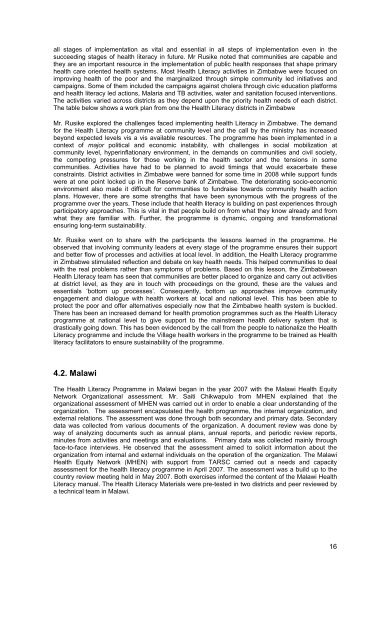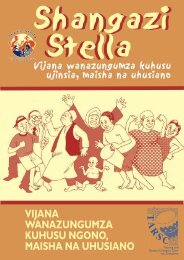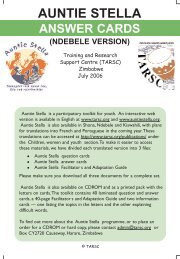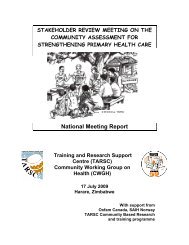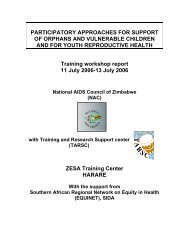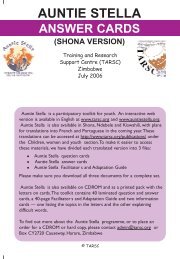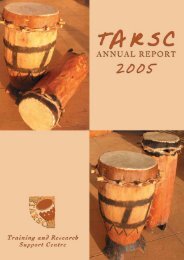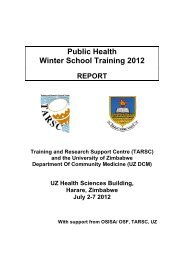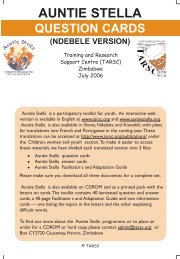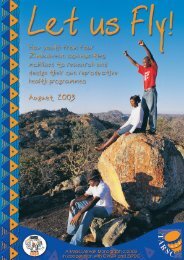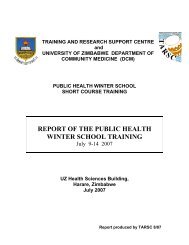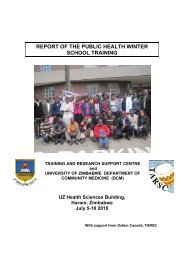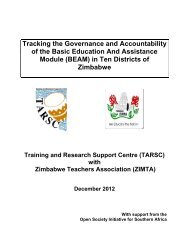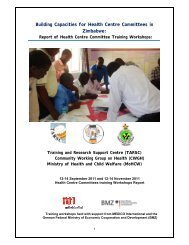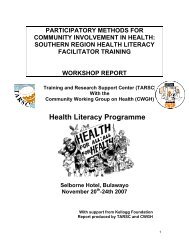HLregional meeting09.pdf - Training and Research Support Centre
HLregional meeting09.pdf - Training and Research Support Centre
HLregional meeting09.pdf - Training and Research Support Centre
Create successful ePaper yourself
Turn your PDF publications into a flip-book with our unique Google optimized e-Paper software.
all stages of implementation as vital <strong>and</strong> essential in all steps of implementation even in the<br />
succeeding stages of health literacy in future. Mr Rusike noted that communities are capable <strong>and</strong><br />
they are an important resource in the implementation of public health responses that shape primary<br />
health care oriented health systems. Most Health Literacy activities in Zimbabwe were focused on<br />
improving health of the poor <strong>and</strong> the marginalized through simple community led initiatives <strong>and</strong><br />
campaigns. Some of them included the campaigns against cholera through civic education platforms<br />
<strong>and</strong> health literacy led actions, Malaria <strong>and</strong> TB activities, water <strong>and</strong> sanitation focused interventions.<br />
The activities varied across districts as they depend upon the priority health needs of each district.<br />
The table below shows a work plan from one the Health Literacy districts in Zimbabwe<br />
Mr. Rusike explored the challenges faced implementing health Literacy in Zimbabwe. The dem<strong>and</strong><br />
for the Health Literacy programme at community level <strong>and</strong> the call by the ministry has increased<br />
beyond expected levels vis a vis available resources. The programme has been implemented in a<br />
context of major political <strong>and</strong> economic instability, with challenges in social mobilization at<br />
community level, hyperinflationary environment, in the dem<strong>and</strong>s on communities <strong>and</strong> civil society,<br />
the competing pressures for those working in the health sector <strong>and</strong> the tensions in some<br />
communities. Activities have had to be planned to avoid timings that would exacerbate these<br />
constraints. District activities in Zimbabwe were banned for some time in 2008 while support funds<br />
were at one point locked up in the Reserve bank of Zimbabwe. The deteriorating socio-economic<br />
environment also made it difficult for communities to fundraise towards community health action<br />
plans. However, there are some strengths that have been synonymous with the progress of the<br />
programme over the years. These include that health literacy is building on past experiences through<br />
participatory approaches. This is vital in that people build on from what they know already <strong>and</strong> from<br />
what they are familiar with. Further, the programme is dynamic, ongoing <strong>and</strong> transformational<br />
ensuring long-term sustainability.<br />
Mr. Rusike went on to share with the participants the lessons learned in the programme. He<br />
observed that involving community leaders at every stage of the programme ensures their support<br />
<strong>and</strong> better flow of processes <strong>and</strong> activities at local level. In addition, the Health Literacy programme<br />
in Zimbabwe stimulated reflection <strong>and</strong> debate on key health needs. This helped communities to deal<br />
with the real problems rather than symptoms of problems. Based on this lesson, the Zimbabwean<br />
Health Literacy team has seen that communities are better placed to organize <strong>and</strong> carry out activities<br />
at district level, as they are in touch with proceedings on the ground, these are the values <strong>and</strong><br />
essentials ‘bottom up processes’. Consequently, bottom up approaches improve community<br />
engagement <strong>and</strong> dialogue with health workers at local <strong>and</strong> national level. This has been able to<br />
protect the poor <strong>and</strong> offer alternatives especially now that the Zimbabwe health system is buckled.<br />
There has been an increased dem<strong>and</strong> for health promotion programmes such as the Health Literacy<br />
programme at national level to give support to the mainstream health delivery system that is<br />
drastically going down. This has been evidenced by the call from the people to nationalize the Health<br />
Literacy programme <strong>and</strong> include the Village health workers in the programme to be trained as Health<br />
literacy facilitators to ensure sustainability of the programme.<br />
4.2. Malawi<br />
The Health Literacy Programme in Malawi began in the year 2007 with the Malawi Health Equity<br />
Network Organizational assessment. Mr. Saiti Chikwapulo from MHEN explained that the<br />
organizational assessment of MHEN was carried out in order to enable a clear underst<strong>and</strong>ing of the<br />
organization. The assessment encapsulated the health programme, the internal organization, <strong>and</strong><br />
external relations. The assessment was done through both secondary <strong>and</strong> primary data. Secondary<br />
data was collected from various documents of the organization. A document review was done by<br />
way of analyzing documents such as annual plans, annual reports, <strong>and</strong> periodic review reports,<br />
minutes from activities <strong>and</strong> meetings <strong>and</strong> evaluations. Primary data was collected mainly through<br />
face-to-face interviews. He observed that the assessment aimed to solicit information about the<br />
organization from internal <strong>and</strong> external individuals on the operation of the organization. The Malawi<br />
Health Equity Network (MHEN) with support from TARSC carried out a needs <strong>and</strong> capacity<br />
assessment for the health literacy programme in April 2007. The assessment was a build up to the<br />
country review meeting held in May 2007. Both exercises informed the content of the Malawi Health<br />
Literacy manual. The Health Literacy Materials were pre-tested in two districts <strong>and</strong> peer reviewed by<br />
a technical team in Malawi.<br />
16


